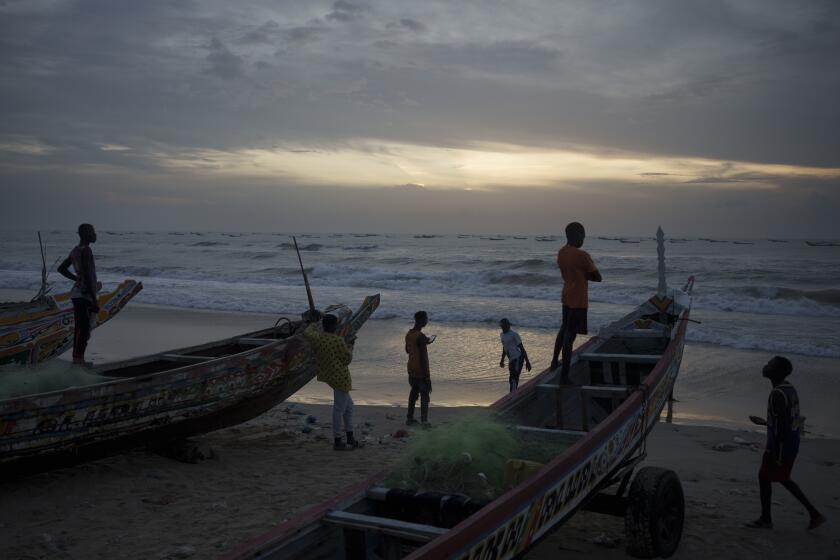Pakistan arrests army officer linked to Times Square bomb suspect
Investigators have arrested a Pakistani army major linked to the prime suspect in the botched attempt to bomb New York City’s Times Square early this month, Pakistani law enforcement sources said Tuesday.
The major’s involvement with suspect Faisal Shahzad, who was arrested at John F. Kennedy International Airport as he attempted to fly to Dubai, United Arab Emirates, remains unclear. Law enforcement sources said the major had met Shahzad, a naturalized U.S. citizen of Pakistani descent, in Islamabad, the capital, and was in cellphone contact with him.
The major’s arrest marks the first time someone in Pakistan’s military establishment has been directly linked to the case. The sources would not say when the alleged meeting and phone calls between Shahzad and the major took place, or what was discussed. They spoke on condition of anonymity because they were not authorized to speak about the investigation.
The twist in the case comes as Pakistani authorities have learned more about the 30-year-old Shahzad’s links with the Pakistani Taliban, the militant group suspected of helping him carry out the attempted bombing.
Another suspect being held by Pakistani authorities is a Pakistani Taliban member who appeared to play the role of liaison between Shahzad and the militant group. The Taliban member has told Pakistani intelligence agents that he met Shahzad three times last summer, Pakistani law enforcement sources said.
At one of those meetings, the Taliban member gave Shahzad an undisclosed amount of money because Shahzad had said he was running out of cash, according to the sources. U.S. officials familiar with the case have said that the Taliban gave Shahzad roughly $15,000 to pay for the attempted bombing.
The Taliban member’s account appears to corroborate assertions by U.S. investigators that the Pakistani Taliban played a significant role in the events that led up to Shahzad’s attempt to detonate an SUV loaded with propane tanks and fertilizer in Times Square on May 1.
Pakistani authorities at first had been skeptical of Shahzad’s claims of Taliban assistance, saying their investigators had uncovered no link between the militant group and Shahzad, now in custody in the United States. And although U.S. officials have thought the idea for the attack was probably Shahzad’s, evidence is mounting that the Taliban was deeply involved in the plot.
The Taliban initially claimed responsibility for the attack, though later the group backed away from that claim and disavowed even knowing Shahzad.
Taliban involvement in the failed bombing would mark the first time that the militant group has carried out an attack outside its homelands in Pakistan and Afghanistan. In a video released this month, Pakistani Taliban leader Hakimullah Mahsud expressed a clear desire to strike targets in the United States in retaliation for the drone strike last year that killed his predecessor, Baitullah Mahsud.
Pakistani investigators are also looking into a trip that Shahzad and the suspected Taliban liaison took from Islamabad to the town of Hasan Abdal in August, Pakistani law enforcement sources said. The pair stayed at the house of a friend of Shahzad’s father, Bahar ul-Haq, a retired vice air marshal in the air force.
The trip is one of several journeys Shahzad made in 2009 during his last stay in Pakistan, a time when investigators believe the Pakistani American crafted his plan to attack Times Square.
Shahzad, who appeared Tuesday in court in New York, has told U.S. investigators that he went to North Waziristan, where he met with Taliban leaders and got training in bombmaking. Pakistani investigators and U.S. officials say they believe Shahzad went to Mohmand, another region within Pakistan’s tribal belt along the Afghan border.
Although Mohmand is also regarded as sanctuary for Taliban militants, it is North Waziristan that has become extremist groups’ hub in the tribal areas. Pakistani Taliban leaders and militants escaping military offensives elsewhere have sought refuge in North Waziristan, as have extremists from Al Qaeda, the Afghan Taliban and an array of Punjabi militant organizations.
Pakistani law enforcement sources say Shahzad got three to five days of training in Mohmand from the Taliban, though they do not say what that training entailed.
U.S. officials said White House national security advisor James L. Jones and CIA Director Leon E. Panetta were in Pakistan to emphasize an Obama administration message of unity with local allies who oppose terrorism.
Times staff writers Tina Susman in New York and David S. Cloud in Washington contributed to this report.
More to Read
Sign up for Essential California
The most important California stories and recommendations in your inbox every morning.
You may occasionally receive promotional content from the Los Angeles Times.










